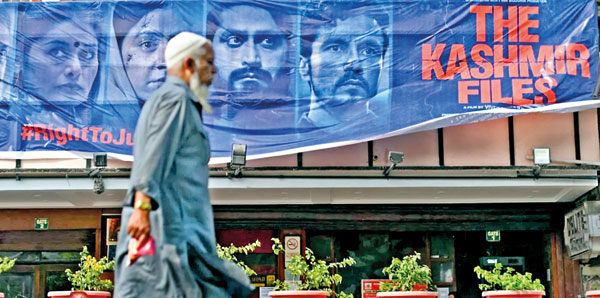Sunday Times 2
I tried watching ‘The Kashmir Files.’ I left the theatre to screams of ‘Go to Pakistan.’
The collective conscience of India is being altered beyond repair with hatred so potent that it even consumes the seemingly most unlikely people — such as the elderly man who arrived in a wheelchair to the theater to watch “The Kashmir Files.”
Two weeks ago, I gathered the courage to go watch the film against the advice of family and friends. “The Kashmir Files,” which portrays the exodus in the 1990s of Kashmiri Pandits, a minority Hindu community, has triggered anti-Muslim hate chants in theaters across India. As soon as I entered the theater in Mumbai, the audience broke into cries of “Bharat Mata ki jai” (Glory to India), a nationalist chant that has been repeatedly weaponised against Muslims. The man in the wheelchair soon joined the chants of “Sab mulle aatankwaadi” (Muslims are terrorists).

A man walks past a banner for film 'The Kashmir Files' in Delhi (AFP)
I left before the movie even began. I tried again the next day. A group of teenagers sitting in the front row soon began chanting “Bharat Mata ki jai.” I was seated in the fourth row, between an expectant mother and an elderly man who spoke proudly of how history in India was being redeemed under Prime Minister Narendra Modi.
The film began, and within 20 minutes there were disturbing scenes of Muslims lusting after Hindu women and a Muslim neighbour betraying his Hindu friend to support terrorism. There were scenes of Muslim kids flaunting Kalashnikovs and insulting Hindu deities. At one point in the movie, a Muslim militant tells a Kashmiri Hindu who wore attire depicting a Hindu god that only those chanting “Allahu akbar” will be allowed to flourish in Kashmir.
That’s when the audience started chanting “Jai Shri Ram” (Glory to Lord Ram). The teens in the front row whistled and started clapping at the slogans. Scenes of Muslims in skullcaps brutally murdering Hindus drew painful gasps from the audience.
The expectant mother seated next to me turned to her husband: “These Muslims are born bastards.” Unable to take the hate, I informed them that I am a Muslim and the language they were using was hate speech against my community. “Hate is what your religion teaches, not ours,” the woman responded. Others seated near us started cheering her statement, and I left the theatre, just 30 minutes into the movie, feeling humiliated and physically unsafe. A man yelled at me “Ja Pakistan!” (Go to Pakistan).
When I complained to a theatre manager about being heckled and abused, he gave a blank look. The film has been a box-office hit. The theatres are packed. The Indian government has even given the film tax privileges, deeming it important for the well-being of the country. That means audiences can buy the tickets at cheaper rates.
The next day, Modi met the cast and crew of the film. In a televised speech, the prime minister mocked the criticism, saying, “Those who always carry the flag of freedom of expression, this entire group has been rattled these past five to six days.”
I’ve written before about the power these films have to stir nationalist fervour and Islamophobic hatred. It’s now a proven formula. But the record-breaking success of “The Kashmir Files” has taken the propaganda to a genocidal level. The film is dominating all discussions. The head of government promotes it while large networks dedicate hours of programming to extolling the bravado in the film.
And even after failing to recover fully from the fear and humiliation I felt at the movie theatre, I have to deal with the news that a court in India’s Karnataka state is upholding a ban against the hijab. The ruling came after Muslim students challenged a ban on headscarves in some educational institutions in the state, a clear violation of their rights. The state government, run by Modi’s Hindu nationalist Bharatiya Janata Party (BJP), argued that wearing a hijab is not an essential practice of Islam.
It’s at times like these that I usually try to take refuge in the words of Mahatma Gandhi, who wrote: “When I despair, I remember that all through history the way of truth and love have always won. There have been tyrants and murderers, and for a time, they can seem invincible, but in the end, they always fall.”
I once had great faith in these lines. But today, I do not.
Hate in India now packs courts and movie theatres — and my despair is giving way to fear. The dark forces seem more invincible than ever.
(Rana Ayyub is an Indian journalist and author of “Gujarat Files: Anatomy of a Cover Up.”)
Courtesy the
Washington Post.

